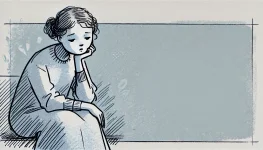Depression is more than just feeling sad or having a bad day. It’s a real medical condition that affects millions of people worldwide, impacting their thoughts, emotions, and daily lives. Let’s break it down in a way that’s easy to understand, compassionate, and empowering.
What is Depression?
Depression, also known as major depressive disorder (MDD), is a mood disorder characterized by persistent feelings of sadness, hopelessness, and a lack of interest or pleasure in activities. It’s more than just a fleeting feeling of sadness—it’s a deep and ongoing struggle that can last weeks, months, or even years if left untreated.Depression doesn’t discriminate. It can affect anyone, regardless of age, gender, or background. Understanding it is the first step toward finding help and healing.
Common Symptoms of Depression
Depression can manifest differently in everyone, but common symptoms include:- Emotional Changes: Persistent sadness, feelings of worthlessness, or excessive guilt.
- Physical Changes: Fatigue, changes in appetite or sleep patterns, and unexplained aches or pains.
- Behavioral Changes: Withdrawal from friends and family, loss of interest in hobbies, or difficulty concentrating.
- Cognitive Changes: Trouble making decisions, memory problems, or recurring negative thoughts.
What Causes Depression?
Depression is often caused by a combination of factors, including:- Biological Factors: Imbalances in brain chemicals like serotonin and dopamine.
- Genetics: A family history of depression can increase risk.
- Environmental Factors: Stressful life events, trauma, or chronic illness.
- Psychological Factors: Personality traits, such as low self-esteem or a tendency toward pessimism.
Living with Depression
Living with depression can feel overwhelming, but help is available. Here are some ways people manage their condition:- Therapy: Talking to a mental health professional can provide coping strategies and emotional support.
- Medication: Antidepressants can help regulate brain chemistry, but they’re not a one-size-fits-all solution.
- Lifestyle Changes: Regular exercise, a balanced diet, and consistent sleep can improve mood and energy levels.
- Support Networks: Connecting with friends, family, or support groups can make a big difference.
- Self-Compassion: Being kind to yourself and recognizing that healing takes time is crucial.
Breaking the Stigma
One of the most challenging aspects of depression is the stigma surrounding it. Many people hesitate to seek help because they fear judgment or don’t want to be seen as weak. But here’s the truth: seeking help is a sign of strength, not weakness. Talking openly about depression helps normalize the conversation and encourages others to seek the support they need.When to Seek Help
If you or someone you know is experiencing symptoms of depression that persist for more than two weeks or interfere with daily life, it’s time to seek professional help. A mental health professional can provide a diagnosis and create a treatment plan tailored to individual needs.Hope is Real
Depression is a challenge, but it’s one that can be faced with the right tools and support. Remember, you are not alone. Millions of people have walked this path and come out stronger on the other side. Help is available, and healing is possible.If you’re struggling, reach out to a trusted friend, family member, or professional. Your mental health matters, and so do you.
Last edited by a moderator:

